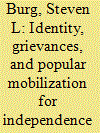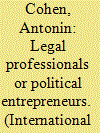| Srl | Item |
| 1 |
ID:
140734


|
|
|
|
|
| Summary/Abstract |
Ted Robert Gurr explains group mobilization in terms of the joint effects of shared identity, economic and status grievances, and the actions of political entrepreneurs. This article examines the relative effects of identity, material grievances, and estimates of the consequences of independence on two key indicators of support for independence in Catalonia: declared preferences for independence and intentions to vote for independence in a future referendum. We examine the impact of political entrepreneurs by analyzing the vote for independence-oriented parties in the 2012 Catalan election. Our findings suggest mobilization is more a product of strong Catalan identity than of grievance, and that mitigation of Catalan demands will therefore require increasing the recognition and status of Catalonia in the Spanish state.
|
|
|
|
|
|
|
|
|
|
|
|
|
|
|
|
| 2 |
ID:
096546


|
|
|
| 3 |
ID:
178556


|
|
|
|
|
| Summary/Abstract |
International institutions are increasingly being challenged by domestic opposition and nationalist political forces. Yet, levels of politicization differ significantly across countries facing the same international authority as well as within countries over time. This raises the question of when and why the mass public poses a challenge to international cooperation. In this article, we develop a theoretical framework for understanding the nature and implications of politicization of international cooperation, outlining three scope conditions: the nature of public contestation, the activities of political entrepreneurs, and the permissiveness of political opportunity structures. By empirically examining these scope conditions, we demonstrate that politicization can have both stabilizing and destabilizing effects on international cooperation. Highlighting the systemic implications of politicization for international cooperation has important implications for international relations scholarship. Although international organizations may face challenges, they also have ways of being remarkably resilient.
|
|
|
|
|
|
|
|
|
|
|
|
|
|
|
|